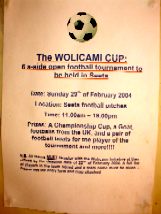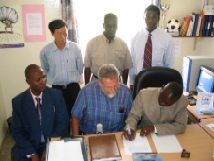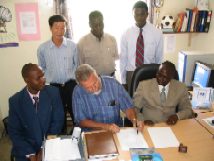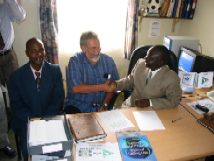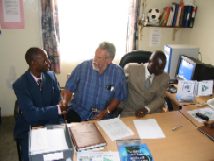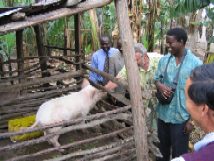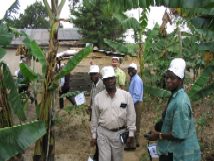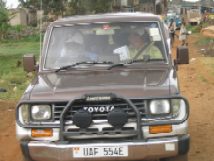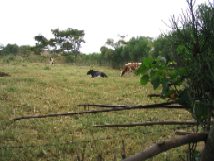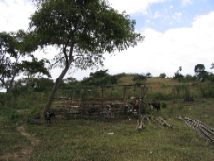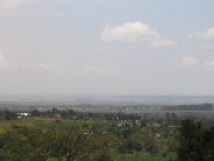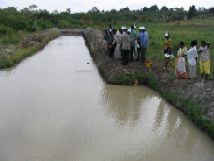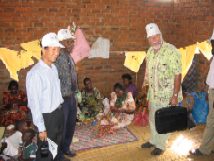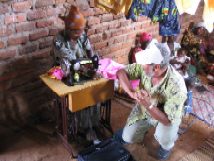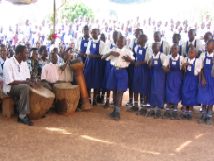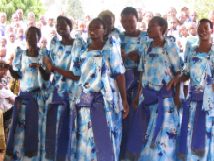|
Tuesday, August 3 My Phone Can Beat Up Your Phone |
We all meet in the hotel's Masaba for breakfast buffet, where the juice comes from an undetermined but bitter fruit, the omelettes - prepared well in advance - are piled in one of the chafing dishes, and the boiled eggs have impossibly firm yolks surrounded by slightly runny whites. We're going to the WOLICAMI office for a meeting this morning, but not before Inno makes an important phone call. He finds that he can't make outside calls from his room phone and uses the front desk phone instead. I encounter him there and find him trying in vain to hear what the other party is saying. The line is noisy and the connection breaks; Inno needs to make this call, but he's reluctant to try the hotel's phone again. I hand him mine and get a quizzical look from the desk clerk, who's obviously not pleased to see me divert some of her phone business.
I explain, "I have a very powerful phone."
The clerk looks as me with a wide, forced smile and says as sweetly as if she were the runner-up in a beauty pageant congratulating the winner, "well, GOOD for YOU!"
Inno finishes his call (and squeezes off a couple of quick text messages before I snatch the phone back), and then we all pile into two cars - Wilson's and Inno's - to go to WOLICAMI. There we make introductions, get a tour, and then sign a management agreement between WILMA and WOLICAMI. My main contribution to the morning is the taking of pictures, and once the signing is complete there's no more for me to do. The others head off to another meeting and drop me off at the hotel along the way.
I go up to my room only to find my way blocked by the cleaning crew. The room is CLOSED, sir! All I really want to do at the moment is drop off some papers and the go to the business center. I toss the papers on top of the desk and then retreat to let the crew finish their work.
I take a seat in the hotel's small business center. A staff member connects to a local ISP through the dial-up service and turns the keyboard and mouse over to me. I can't connect to WILMA mail. I can't connect to WILMO mail. I can't even connect to Laughton.org mail to see if anyone has entered my contest. The attendant apologizes and explains that this happens "all the time." I remember that my e-mail reservation inquiry was neglected for an entire week due to such problems, so I am not hopeful about getting the current problem resolved quickly.
Since my room is being cleaned, I can't go back upstairs and work on my own computer right now. I go to the front desk and ask if there's an internet café within walking distance. The eyerolls alone tell me the answer is no, but the ever-helpful staff give me a complete rundown of the geographic distribution of reliable internet cafés and explain the futility of trying to reach any of them. There's not much I can do other than sit in the lobby. I wait a while and then ask if I can have my key. No, the room is still closed for cleaning. I wait some more.
Once per hour I try the business center again to see if the connection has improved. On my first try, the opposite is true: the dial-up service can't even establish a connection. The result is the same on my second and third retries, at which point my room is finally declared clean. I go up and elevate my feet for a while. The left one has completely recovered from the rash that developed in Dar es Salaam, but the right is still a bit irritated. And yes, the room is sparkling clean!
I make one more visit to the business center in the afternoon, but the computer still can't connect. When Paul returns in the early evening, I explain the dilemma: he's put his computer guy in an internet-free zone. I suggest that we find a nice place for dinner that's next to an internet café if one of our local colleagues knows of such a place; I also note that if nobody has a better suggestion, the Sheraton fills these requirements. Alas, Paul is too tired from his day of meetings to even think about eating outside the hotel, so instead we decide to ask Inno's driver Nohu to take me to the nearest recommended internet café, after which I'll return to the hotel for dinner with the rest of our party.
We ask at the front desk about internet cafés. The clerk says there's one on the main road "in a big building just past the Caltex filling station." Just to be sure we don't miss it, one of the bellmen comes with us, clad in his scarlet jacket with black-and-gold epaulets. We head down the road through busy but briskly-moving traffic until we see the brightly lit Caltex sign. There's a big building right behind the station, so Nohu slows down to get a good look at it, a move that's immediately accompanied by honking from behind. Everybody on this road but us is in a hurry. We all scan the big building, but it's obvious that there's no internet café in it (it appears to be strictly residential), and everything else in sight is either a filling station or a small shop selling produce, shoes, or other necessities.
To the relief of the line of drivers behind us, Nohu pulls over to ask in one of the local shops. Both he and the bellman jump out and run toward shops in different directions. The bellman gets immediate attention from all the locals; they seem to be a bit wary of anyone in uniform, but once they spot the Ridar Hotel logo on his jacket they're put at ease. He gets the answer he seeks and returns to the car: it's in the big building after the second Caltex station.
I honk the horn to get Nohu's attention. He's across the street, and it takes him some time to cross the busy traffic and get back behind the wheel. We start again and soon come to another Caltex station. This time there's a sign advertising an internet café. We pull up, and the friendly locals direct me and the bellman to two different cafés in the same building. The one on ground level looks reasonable, so I take a seat. The connection is slow, but it works, and when I connect to WILMA mail I find that no responses have arrived to any of the important messages I sent from Dar es Salaam. I pay the equivalent of less than 50¢ for my half hour of 'net surfing and return to the hotel.
Our group is rather disorganized tonight, and I'm not even sure who's in our group at the moment. John N., whom I met on a previous trip, shows up and joins me, Inno, and Bushko at a table outside the hotel bar. The others drift in, and we repeatedly add more and more settings to our pair of tables. We're practically elbow-to-elbow by the time the last person joins us. Space is limited since the bar is the only place on the hotel grounds serving dinner tonight, so we try not to jostle each other too much as we have a buffet dinner before turning in for the night.
